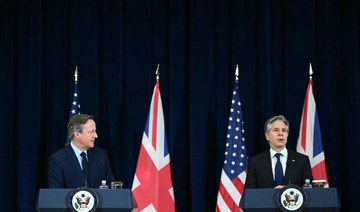LAQAYI, Afghanistan: More than 300 people were killed in flash floods that ripped through multiple Afghan provinces, the UN’s World Food Programme said Saturday, as authorities declared a state of emergency and rushed to rescue the injured.
Many people remain missing after heavy rains Friday sent roaring rivers of water and mud crashing through villages and across agricultural land in several provinces, causing what one aid group described as a “major humanitarian emergency.”
Survivors on Saturday picked through muddy, debris-littered streets and damaged buildings, an AFP journalist saw, as authorities and non-governmental groups deployed rescue workers and aid, warning that some areas had been cut off by the flooding.
Northern Baghlan province was one of the hardest hit, with more than 300 people killed there alone, and thousands of houses destroyed or damaged, according to WFP.
“On current information: in Baghlan province there are 311 fatalities, 2,011 houses destroyed and 2,800 houses damaged,” Rana Deraz, a communications officer for the United Nations agency in Afghanistan, told AFP.
There were disparities between the death tolls provided by the government and humanitarian agencies.
The UN’s International Organization for Migration said there were 218 deaths in Baghlan.
Abdul Mateen Qani, spokesman for the interior ministry, told AFP that 131 people had been killed in Baghlan, but that the government toll could rise.
“Many people are still missing,” he said.
Another 20 people were reported dead in northern Takhar province and two in neighboring Badakhshan, he added.
Taliban government spokesman Zabihullah Mujahid said on X: “Hundreds of our fellow citizens have succumbed to these calamitous floods.”
He added “the deluge has wrought extensive devastation upon residential properties, resulting in significant financial losses.”
Torrential rains caused heavy damage in Baghlan, Takhar and Badakhshan, as well as western Ghor and Herat provinces, officials said, in a country wracked by poverty and heavily dependent on agriculture.
“My house and my whole life was swept away by the flood,” said Jan Mohammad Din Mohammad, a resident of Baghlan provincial capital Pul-e-Khumri.
His family had managed to flee to higher ground but when the weather cleared and they returned home, “there was nothing left, all my belongings and my house had been destroyed,” he said.
“I don’t know where to take my family... I don’t know what to do.”
Emergency personnel were rushing to rescue injured and stranded Afghans.
The air force said it had started evacuation operations as skies cleared Saturday, adding that more than 100 injured people had been transferred to hospital.
“By announcing the state of emergency in (affected) areas, the Ministry of National Defense has started distributing food, medicine and first aid to the impacted people,” it said.
An AFP journalist saw a vehicle laden with food and water in Baghlan’s Baghlan-i-Markazi district, as well as others carrying the dead to be buried.
United Nations chief Antonio Guterres “expresses his solidarity with the people of Afghanistan (and) extends his condolences to the families of the victims,” his spokesman Stephane Dujarric said, adding that the UN was working with local authorities on providing assistance.
The International Rescue Committee was also preparing a rapid response, adding that the floods should act as an “alarm bell” reminding world leaders and donors not to forget a country devastated by decades of conflict and beset by natural calamity.
“These latest floods have caused a major humanitarian emergency in Afghanistan, which is still reeling from a string of earthquakes” this year and severe flooding in March, IRC country director Salma Ben Aissa said in a statement.
Since mid-April, flash flooding and other floods had left about 100 people dead in 10 of Afghanistan’s provinces, authorities said.
Farmland has been swamped in a country where 80 percent of the more than 40 million people depend on agriculture to survive.
Afghanistan — which had a relatively dry winter, making it more difficult for the soil to absorb rainfall — is highly vulnerable to climate change.
The nation, ravaged by four decades of war, is one of the world’s poorest and, according to scientists, one of the worst prepared to face the consequences of global warming.
The UN special rapporteur for human rights in Afghanistan, Richard Bennett, said on X the floods were “a stark reminder of Afghanistan’s vulnerability to the #climatecrisis.”
“Both immediate aid and long term planning by the #Taliban & international actors are needed.”

























